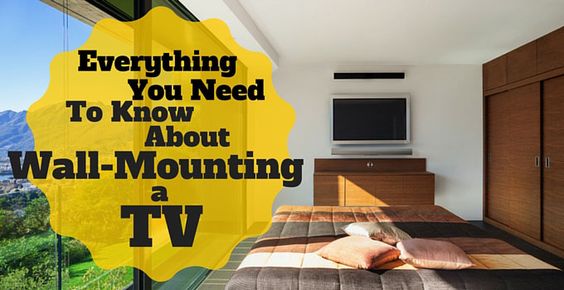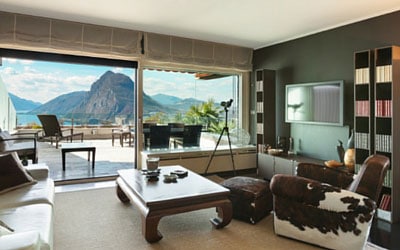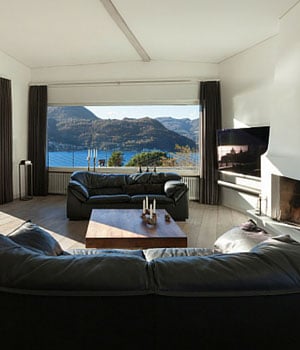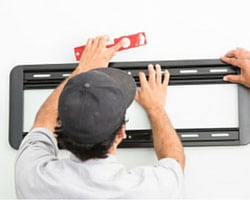
Everything You Need to Know About Wall-Mounting a TV
April 2025 by couponlab
So you’re considering wall-mounting your flat screen TV, but you don’t know if it’s right for you? Good news, friend: we’ve got answers to all of the most important questions you might have about TV wall-mounting.
Table of Contents
WHEN SHOULD YOU WALL-MOUNT A TV?
Before you start planning where you should mount your TV and what materials you’ll need, take a step back and consider whether or not your TV should be mounted at all. You might actually be better off not wall-mounting your TV. For instance, if you have a nice stand to mount it on and don’t mind the space that the stand will take up in your TV room, you may just be better off not wall-mounting your TV. Mounting your TV on the wall can be a costly and cumbersome process, and in most cases, simply putting it on a stand can save you a lot of time and money.
However, as we’ll discover in the next section, the argument for wall-mounting a TV has a lot going for it. So if you don’t have enough space for a stand in your TV room and there’s plenty of space for a TV on your wall, then it may be time for you to wall-mount your TV.
WHY SHOULD YOU WALL MOUNT A TV?
A mounted TV can do so many wonderful things for your room that it’s hard to decide where to begin. Here are three key reasons you should consider wall-mounting your TV:
REASON 1: SPACE
A mounted TV can save you a lot of space by getting rid of the need for a TV stand. Peter Ranvestel of Abt Electronics says that getting rid of a stand not only saves you space, but it also means less surfaces for you to have to clean. He also says that mounting a TV on the wall is great because it keeps the TV out of reach of children and pets who could potentially damage the television, or worse, themselves, by messing with it.
REASON 2: STYLE

WALL-MOUNTING REALLY TIES THE WHOLE ROOM TOGETHER
Another great reason to mount your TV is that it can enhance the look of a room. The Internet is full of pictures of great TV mount jobs that really tie a room together. As Sarah Pike of CableTV.com puts it, “flat screens are flat because they are meant to be mounted to a wall.” They just look more natural being hung like a picture than being placed on a stand like their bulky old ancestors. Plus, you could even turn your wall-mounted TV into a digital photo frame when it’s not in use, so that’s pretty cool.
REASON 3: SITUATIONAL FLEXIBILITY
Mounting your TV is also a great option for enhancing the flexibility of your viewing experience. By mounting your TV with an adjustable mount, you can change the viewing angle depending on your situation. Luis Leonzo of TableLegsOnline.com says that this is especially handy when “watching TV with a group of people” because you are able to adjust the TV so that “everyone has a comfortable view of the screen.” Gone are the days of the static TV that dictated where you sit! Truly, wall-mounting has changed the TV-watching game.
WHERE SHOULD YOU WALL MOUNT A TV?
Now that you know why wall-mounting your flat screen is a great option, you’re probably wondering where you should hang yours to get that amazing mounted effect. Well, as Sam Williamson, formerly of KBHomeSpecialists points out, “The great thing about wall-mounted TVs is that, because they can be mounted away from the ground, they can be installed anywhere. This includes kitchens, bedrooms and even bathrooms.” But just because a flat screen can be mounted anywhere doesn’t mean it should be mounted anywhere. Many factors should be taken into account first before you choose where to mount it. Below we have listed a few of the major questions that you may want to consider:
HOW ARE YOU PLANNING ON WATCHING YOUR TV?
This is an important question to ask yourself because it will determine how high you should mount it. For example, if you plan on watching your TV mainly while sitting on your couch, then you’re going to want to mount it so that your eyes are on the center of the screen when seated comfortably. Otherwise, if you mount it so that you’re going to have to look up to view it while sitting on your couch, then you’re probably not going to have the most comfortable viewing experience. In fact, it’s going to be a literal pain in the neck. One of the ways to avoid this is to use a TV height finder like this one from Sanus.
However, there are instances when you will probably want to mount your TV higher rather than lower. For example, if you like to watch TV while you make dinner, then you’re probably going to want to mount it up higher in your kitchen so that you can watch it comfortably while you stand by the stove. Or if you want to mount it in the bedroom, you may want to consider mounting it up near or on the ceiling so you’ll be able to watch it comfortably and not have to crane your neck while lying on your bed.
In short, you’re going to want to mount it so that your eyes will be on the center of the screen while in your normal viewing position. And keep in mind that dynamic mounts can be a big help if you want to mount your TV in a room where you sometimes like to sit and other times like to stand when you watch.
WHERE’S THE GLARE COMING FROM?

DON’T FORGET TO TAKE GLARE INTO ACCOUNT
The thing about mounting a TV is, once it’s mounted, it’s really a pain in the butt to unmount it. So it’s important to consider factors like glare before hanging it up. Robert White, founder of the impressive design company Robert Made It, lists this as one of the most important considerations one should make before mounting a TV, saying, “You want to think about where the sun rises and sets in relation to your windows. Nothing is worse than not being able to actually see the TV due to screen glare!” Truly, you’re going to want to consider glare, along with any other factors that might inhibit your ability to enjoy your TV, before drilling those first holes.
WHAT TYPE OF WALL IS IT?
Now this may seem like an odd question, but it’s a pertinent one for many reasons. One big reason is that, depending on what the wall is made of, there are different hanging methods for different types of surfaces. J.B. Sassano, president of home improvement company Mr. Handyman, suggests that if your wall is made of metal studs or brick, you’re definitely going to want to call a professional because there are special ways to mount to those types of materials. In other words, hanging on those special types of materials is going to be costlier than hanging on normal wood-framed walls because you’re going to have to pay a professional to do it for you.
If your wall is a normal wood-framed wall, then you’re going to want to know where the studs are before you try to hang your TV yourself. Hanging your TV anywhere other than on the studs is dangerous because it greatly increases the chances that your TV will fall off the wall, and that’s no fun at all (pardon the rhyme). David Viggiano says you’re going to want to “choose a wall that has electrical already run through it and a location as close to the cable input as possible.” This is important because otherwise you’re going to have to get an electrician involved, which means more money out of your pocketbook.
IS MOUNTING IT OVER A FIREPLACE REALLY A GOOD IDEA?

IMAGE VIA PINTEREST.COM
This debate has been raging on the Internet for a long time, with proponents claiming that the above-the-fireplace look is classy, while its critics argue it has way too many flaws. One of the main flaws they point out is that mounting it above the fireplace makes it too high to view the screen comfortably from your couch. Of course, as we mentioned above, this problem can be alleviated with a dynamic mount. However, the critics also point to problems that can’t be fixed with a dynamic mount, such as heat damage. As TV-mounting expert Sarah Pike puts it, “One place to definitely avoid TV placement is above the fireplace; doing so can lead to damage from heat.” However, there are mounts that have features that help to prevent heat damage, such as the MantelMount, which features handles that turn red when the temperature reaches above 110 degrees, telling you if your TV is getting too hot. Overall, it’s probably best to steer clear of over-the-fireplace mounting, but if you really want that classy look, be sure to get a good mount like the MantelMount and keep an eye out for signs of heat damage.
WHO SHOULD WALL-MOUNT A TV?

ALWAYS GOOD TO HAVE HELP FROM A FRIEND
So should you install your new 4k TV yourself or have a professional do it for you? To properly answer this one, you must first do a little self examination. Have you done DIY projects in the past? Are you comfortable using power tools and working with electrical wires? Do you have a friend or multiple friends who would be willing to help you with the project? This last question is one commonly asked by the experts because it is very important to have help when working on this delicate process. You’re definitely going to need someone to hold the TV while you screw it in, so if you don’t have someone to do that, you’re going to want to call in the professionals.
You’re also going to want to consider the nature of the project. Peter Ranvestel lays out this decision process very simply: “If it’s a larger TV and you’d like to install it with hidden cabling, we highly recommend hiring a professional to mount your TV. A smaller set that doesn’t require hidden cables … is a good project for a DIYer who’s sure of their skills.” Ultimately, you should listen to your gut when deciding whether or not to hang your TV yourself. If you’re not entirely comfortable doing it yourself, call a professional. Better safe than sorry.
Of course, you also really want to be sure that you absolutely can’t do it yourself before calling in a professional because professionals cost money. For example, Best Buy offers TV-mounting services through their Geek Squad, but those generally cost $149.99 at the cheapest. Buying a flat screen TV is already expensive enough without having to add on the cost of hiring professionals to install it for you, so doing it yourself is definitely a good option to pursue if you have the capability and want to save money.
WHAT MATERIALS DO YOU NEED TO WALL-MOUNT A TV?

KEEP IT LEVEL
If you do decide to do it yourself, you’re going to need the proper tools and materials. Obviously these are going to vary from one mounting job to the next depending on the size of TV, the type of mount you’re using and the type of wall you’re mounting the TV on. However, we can still give you an idea of some of the important tools you’re likely going to need and why you’re going to want to have them. So here’s a list:
- Painters Tape – J.B. Sassano recommends that you use painters tape to lay out the size of your TV on the wall before installing it so that you can have a clear visual of how your TV will look before you begin installing it.
- Stud Finder – This piece of equipment is absolutely crucial because hanging your TV anywhere other than on studs is potentially disastrous.
- Power Drill and Bits – Use this for screwing your wall mount into the wall.
- Level – There’s no doubt you’re going to want to use a level. No one wants to have to slightly crane their neck while watching a crooked TV!
- TV Wall-Mount Kit – As The Home Depot puts it in their how-to guide, the best way to have the cleanest, most efficient TV wall-mounting process is to purchase the wall-mounting kit for your specific TV. Following the instructions that come with this kit will give you the best chance at a successful mounted TV installation.
Aside from knowing the important materials you will need, it’s also important to know about the different types of wall mounts that are available for you to choose from. Here is a list of the five main types of TV mounts and their definitions:
- Flat Mount – Use this if you want to mount your TV flat against the wall and know you’re never going to need to tilt it up or down, left or right.
- Tilt Mount – This is a great mount to use if you want to hang your TV up high because it tilts vertically, allowing you to easily watch it from below.
- Tilt and Swivel Mount – This mount offers a full range of motion and is great if you know you’re going to want to watch your TV from many different angles.
- MantelMount – This is a great mount to use if you really want to hang your TV up high but watch it down low. MantelMount allows you to lower your TV up to 24″ from the its raised position.
- Ceiling Mount – This mount hangs down from the ceiling and often allows you to turn the TV horizontally. It’s a great choice if you can’t feasibly hang your TV from the wall for some reason.
Finally, keep in mind that the Internet is full of great how-to guides that can help you on your TV mounting quest, such as this one from our friends at Abt Electronics.